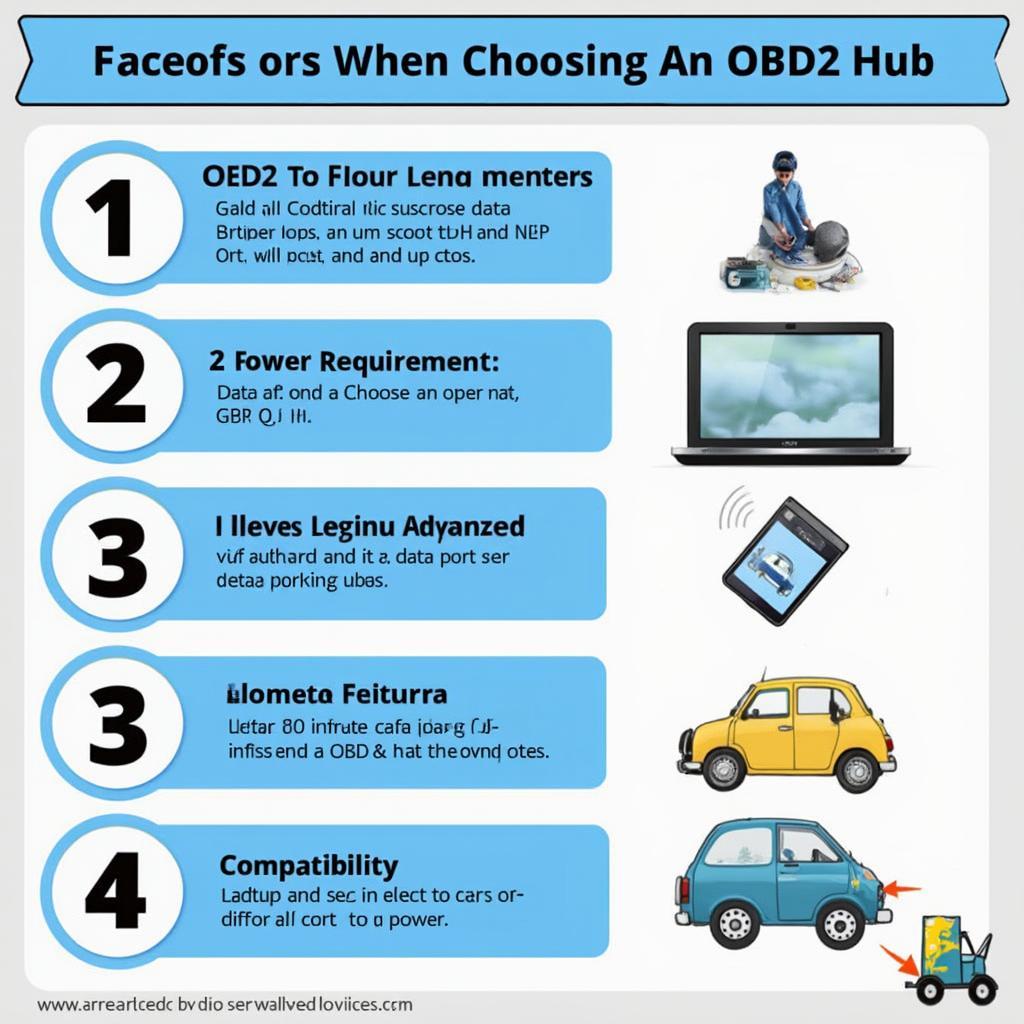An OBD2 hub, also known as an OBD2 splitter or multiplexer, expands the capabilities of your vehicle’s OBD2 port. It allows you to connect multiple devices simultaneously, opening up a world of diagnostic and monitoring possibilities. This article will delve into the functionalities, benefits, and various applications of OBD2 hubs, helping you choose the right one for your needs.
What is an OBD2 Hub and Why Do You Need One?
An OBD2 hub is a small device that plugs into your vehicle’s OBD2 port, typically located under the dashboard on the driver’s side. It provides multiple OBD2 ports, enabling you to connect several devices at once. This is particularly useful for those who use various OBD2 tools, such as a code reader, a GPS tracker, and a performance monitor, simultaneously. Imagine wanting to monitor your engine performance in real-time while also tracking your vehicle’s location. An OBD2 hub makes this possible without the hassle of constantly swapping devices.
Different Types of OBD2 Hubs and Their Applications
OBD2 hubs are available in various configurations and functionalities, catering to different needs. Some common types include:
- Standard OBD2 Splitters: These offer basic splitting functionality, allowing you to connect two or more OBD2 devices.
- Powered OBD2 Hubs: These hubs provide power to the connected devices, preventing battery drain and ensuring stable operation.
- Switching OBD2 Hubs: These hubs allow you to switch between different connected devices without physically unplugging them.
- OBD2 Hubs with Data Logging Capabilities: These advanced hubs can log data from multiple sensors and store it for later analysis.
Choosing the right OBD2 hub depends on your specific requirements. If you simply need to connect two devices, a standard splitter might suffice. However, for more complex applications like data logging or using power-hungry devices, a powered or switching hub is recommended.
How to Choose the Right OBD2 Hub for Your Needs
Selecting the correct OBD2 hub involves considering several factors. Think about the number of devices you need to connect, the power requirements of those devices, and any additional features you may require, such as data logging or switching capabilities. Compatibility with your vehicle’s OBD2 protocol is also crucial. Most modern vehicles use the OBD2 standard, but some older models may use different protocols.
 Selecting the Right OBD2 Hub
Selecting the Right OBD2 Hub
What is the purpose of an OBD2 hub? It simplifies the use of multiple diagnostic tools. What are the different types of OBD2 hubs? They range from simple splitters to advanced data loggers. How do I choose the right one? Consider your needs and vehicle compatibility.
Benefits of Using an OBD2 Hub
Using an OBD2 hub provides several advantages, including:
- Simultaneous Connection: Connect multiple diagnostic and monitoring tools at the same time.
- Convenience: No more swapping devices; switch between them seamlessly.
- Enhanced Diagnostics: Gain a more comprehensive view of your vehicle’s health by using various tools simultaneously.
- Improved Monitoring: Track multiple parameters simultaneously for a more complete picture.
Conclusion: Unlocking the Full Potential of Your OBD2 Port with an OBD2 Hub
An OBD2 hub is a valuable tool for anyone looking to maximize the functionality of their vehicle’s OBD2 port. Whether you’re a professional mechanic, a car enthusiast, or simply want to keep a closer eye on your vehicle’s health, an obd2 hub can simplify your diagnostic and monitoring tasks. By understanding the various types and functionalities available, you can choose the right obd2 hub to meet your specific needs. Check out obd2 github.com for more technical resources.
FAQ
- Can I use an OBD2 hub with any vehicle?
- What is the maximum number of devices I can connect to an OBD2 hub?
- Does using an OBD2 hub drain my car’s battery?
- Are OBD2 hubs expensive?
- Where can I buy a reliable OBD2 hub?
- What is the difference between an OBD2 hub and a splitter?
- Can I use an OBD2 hub with 2016 f 150 obd2-hub 9 pin d cable?
Common OBD2 Hub Scenarios
- Fleet Management: Businesses use OBD2 hubs to track multiple vehicles simultaneously.
- Diagnostics in Repair Shops: Mechanics use hubs to connect various diagnostic tools at once.
- Performance Tuning: Enthusiasts use hubs to monitor various engine parameters in real-time.
Explore More Related Topics
You may also be interested in obd2 android github or torque obd2 github for more information on open-source OBD2 projects. Visit our page on github obd2 for further details.
Contact Us
Need help with OBD2 scanners or hubs? Contact us via WhatsApp: +1(641)206-8880, Email: [email protected] or visit us at 789 Elm Street, San Francisco, CA 94102, USA. Our customer service team is available 24/7.